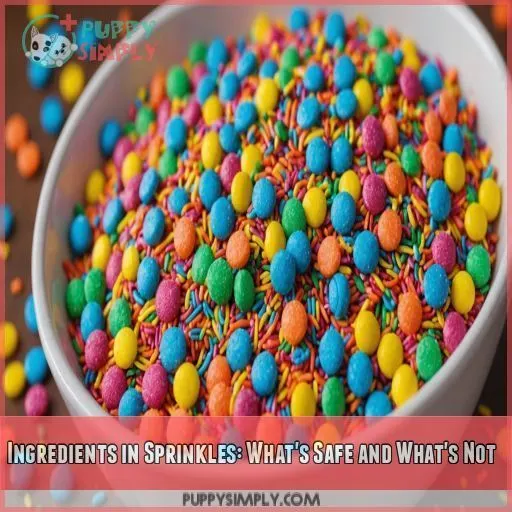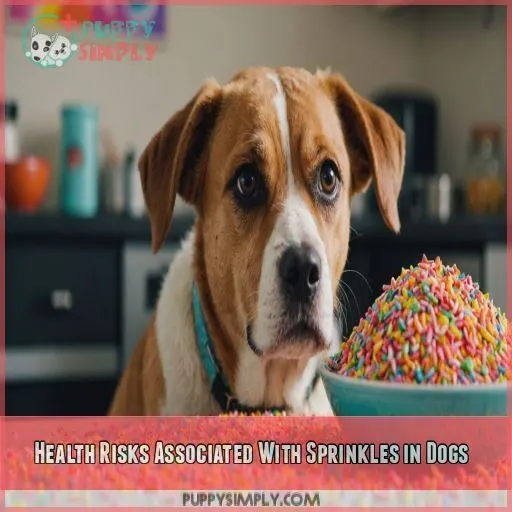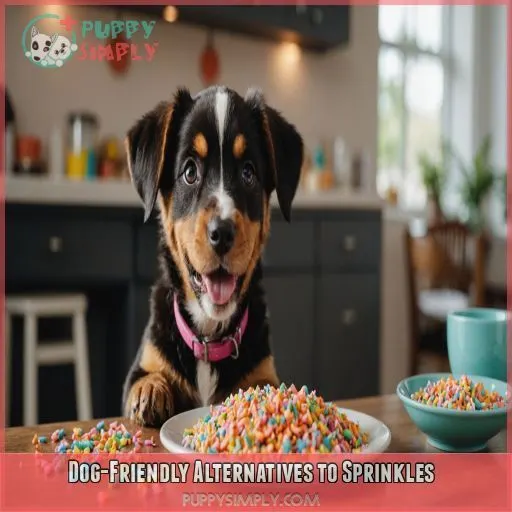This site is supported by our readers. We may earn a commission, at no cost to you, if you purchase through links.

But, can dogs eat sprinkles?
Unfortunately, it’s a recipe for disaster.
Those tiny treats are packed with sugar, which can lead to obesity, diabetes, and Dental Problems in dogs.
And, let’s not forget the hidden dangers like xylitol and chocolate, which are toxic to dogs.
So, it’s best to keep those sprinkles out of reach.
But don’t worry, there are plenty of dog-friendly alternatives that are just as tasty and fun.
Want to know what they are?
You’re about to discover a whole new world of canine treats that are safe, healthy, and utterly paw-some!
Table Of Contents
Key Takeaways
- Don’t even think about sharing those colorful sprinkles with your furry friend – they’re a recipe for disaster! Consuming high amounts of sugar can lead to obesity, diabetes, and dental problems in dogs, and hidden dangers like xylitol and chocolate can be downright toxic.
- You’ve got to be a label reader when it comes to sprinkles – common ingredients like milk, soy, and wheat can trigger allergic reactions, causing skin irritation and ear infections in your pup. And, of course, there are those pesky artificial additives and food dyes that can wreak havoc on their digestive system.
- It’s time to get creative with healthy alternatives! You can easily whip up dog-friendly treats using fruits and veggies, like pumpkin pupcakes, green bean crunch, or sweet potato chews. And, if you’re short on time, look for store-bought options like yogurt drops or sweet potato chews that are just as yummy and safe for your furry friend.
- Remember, treats should be a rare delight, not a daily staple. Limit those treats and practice portion control to avoid overfeeding your pup. And always consult with your vet before making any changes to your dog’s diet – they’ll help you create a personalized plan that’s tailored to your furry friend’s unique needs and health concerns.
Can Dogs Eat Sprinkles Safely
If you’re a dog owner who loves spoiling your furry friend with sweet treats, you’ve probably wondered whether sprinkles are safe for canine consumption. The truth is, sprinkles can pose a risk to your dog’s health due to their high sugar content and potential allergens, so you need to be aware of the risks before indulging your pup (Source).
Understanding Canine Nutrition Needs
Feeding your dog is like putting together a puzzle: every piece matters. Homemade dog food or raw diets might sound good, but you have to be careful about missing nutrients. Older dogs have special needs, too. Look for reputable dog food brands and talk to your vet to make sure your pup gets the right stuff.
The Risks of Sugar Consumption in Dogs
Consuming high amounts of sugar can lead to a host of health issues in dogs, including obesity, diabetes, and dental problems.
You really want to limit sugary treats and opt for natural alternatives instead.
Your furry friend’s sweet tooth can be a recipe for disaster if not managed properly.
How Sprinkles Can Affect Canine Health
Here’s the shocking truth: sprinkles can be a recipe for disaster in dogs! Consuming high amounts of sugar can lead to digestive issues, obesity, and even diabetes. And, let’s not forget about potential allergens and toxins in sprinkle ingredients. Your furry friend’s taste buds might do the happy dance, but their health will pay the price.
Ingredients in Sprinkles: What’s Safe and What’s Not
As you consider sharing sprinkles with your furry friend, it’s key to understand what’s in them. Common sprinkle ingredients like sugar, food coloring, milk, soy, and wheat can be problematic for dogs, and hidden dangers like xylitol and chocolate can be downright toxic (Source).
Common Sprinkle Ingredients: Sugar, Food Coloring
Now that we’ve covered the basics of canine nutrition, let’s get real about what’s in those colorful sprinkles. Most sprinkles are made from sugar and food coloring – a.k.a. artificial additives and food dyes. These combos might create a fun, festive look, but they’re not doing your pup any favors. Think of them as unhealthy, sugary concoctions.
Potential Allergens: Milk, Soy, Wheat
In the case of sprinkles, beware of potential allergens that can wreak havoc on your furry friend’s health. Here are 4 common culprits to watch out for:
- Milk: Can cause digestive issues, skin rashes, and ear infections.
- Soy: May lead to itching, hair loss, and skin irritation.
- Wheat: Can trigger digestive problems, vomiting, and diarrhea.
- Combination allergies: Can cause a perfect storm of symptoms, making diagnosis tricky.
Hidden Dangers: Xylitol, Chocolate
Here’s the lowdown: some sprinkles contain hidden dangers like xylitol and chocolate. Xylitol toxicity symptoms include vomiting, seizures, and even liver failure. Chocolate poisoning signs range from hyperactivity to heart problems. Be aware of sugar substitute risks and keep canine candy dangers out of reach. Stay vigilant and prioritize toxic ingredient awareness to keep your furry friend safe!
Health Risks Associated With Sprinkles in Dogs
As you think about sharing sprinkles with your furry friend, it’s vital to understand the potential health risks involved.
Consuming sprinkles can lead to a range of issues in dogs, from gastrointestinal problems and allergic reactions to long-term consequences like tooth decay and nutrient imbalances.
You need to make informed choices about what treats you give your dog.
Gastrointestinal Issues: Vomiting, Diarrhea
If your furry friend gets into sprinkles, be prepared for a potential stomach upset. The high sugar and fat content can wreak havoc on their digestive system, leading to vomiting and diarrhea. In severe cases, an intestinal blockage can occur if sprinkles accumulate in their gut. Watch for signs of food intolerance, like lethargy, loss of appetite, or bloody stools.
Increased Risk of Obesity and Diabetes
Let’s get real – sprinkles can be a real treat trap for your furry friend.
Consuming high-sugar treats like sprinkles regularly can lead to insulin resistance, obesity, and even diabetes in dogs.
Practice healthy snacking habits by limiting canine sugar intake and focusing on weight management tips.
Your pup’s health is worth it – make the switch to disease prevention strategies today!
Allergic Reactions and Skin Issues
You’re likely no stranger to your dog’s itchy woes, but sprinkles can be a recipe for disaster. Common sprinkle ingredients like milk, soy, and wheat can trigger allergic reactions, causing skin irritation and ear infections. If you notice excessive scratching or hair loss, consult with your vet about food allergy testing and canine itch relief strategies.
Long-Term Consequences: Tooth Decay, Nutrient Imbalances
In the case of sprinkles, the long-term consequences for your dog can be dire. Consuming these sugary treats regularly can lead to tooth decay, nutrient imbalances, and a host of other issues. Here are just a few problems you might face:
- Dental health issues from sugar-fueled bacteria growth
- Nutrient deficiency risks from a diet of empty calories
- Sugar addiction problems that can lead to overeating
- Digestive health concerns from artificial ingredients and dyes
Dog-Friendly Alternatives to Sprinkles
Want to add some fun to your dog’s treats without risking their health?
Don’t worry, there are plenty of dog-friendly alternatives to sprinkles that are just as tasty and festive .
You can give your furry friend a special indulgence without compromising their well-being .
Here are some ideas:
- Homemade treats like carrot and apple bites
- Store-bought options like yogurt drops and sweet potato chews
Homemade Treats: Carrot, Apple, Peanut Butter
The sweet temptation of sprinkles! Instead, treat your furry friend to wholesome homemade goodies. Try carrot, apple, and peanut butter treats – they’re easy to make and pack a nutritional punch. Use dog-friendly ingredients and recipes to avoid allergies and sensitivities. Your pup will thank you for the healthy snacks, and so will their tail-wagging taste buds!
Store-Bought Options: Yogurt Drops, Sweet Potato Chews
Now that you’ve got the scoop on homemade treats, let’s explore store-bought options that are just as yummy and safe for your furry friend.
Yogurt drops from brands like Zuke’s or The Honest Kitchen are great alternatives.
Sweet potato chews provide a nutrient-rich, easily digestible snack.
Just remember, moderation is key – treats shouldn’t exceed 10% of your dog’s daily calorie intake.
Fruit and Veggie-Based Treats: Pumpkin, Green Beans
Time to get creative with healthy alternatives! You can easily whip up dog-friendly treats using fruits and veggies. Here are three yummy options:
- Pumpkin Pupcakes: Mix cooked pumpkin with oats and honey for a tasty, fiber-rich treat.
- Green Bean Crunch: Steam green beans and serve as a crunchy snack.
- Sweet Potato Chews: Bake or dehydrate sliced sweet potatoes for a nutrient-rich reward.
Tips for a Safe and Balanced Canine Diet
When it comes to dog treats, it’s super important to make sure your furry friend eats a safe and balanced diet. By limiting treats, choosing healthy foods, and talking to your vet, you can help your dog stay healthy and avoid the problems that sugary snacks like sprinkles can cause.
Limiting Treats and Avoiding Overfeeding
Now that you’ve got some dog-friendly alternatives to sprinkles, remember: treats should be a rare delight, not a daily staple. To avoid overfeeding, limit treat frequency and practice portion control. Count those calories and opt for healthy alternatives. Your pup’s weight management (and their tail) will thank you. Keep those treats in check!
Choosing Wholesome, Nutrient-Rich Foods
Now that you’re limiting treats and avoiding overfeeding, it’s time to focus on choosing wholesome, nutrient-rich foods for your furry friend. Here are 4 essentials to get you started:
- Whole food ingredients: Opt for dog food brands with named protein sources (chicken, salmon) and whole grains (brown rice, oats).
- Homemade recipes: Consider adding homemade meals to your dog’s diet, using ingredients like sweet potatoes and green beans.
- Raw food diets: If you’re considering a raw diet, make sure it’s balanced and complete to avoid nutritional deficiencies.
- Food allergy awareness: Monitor your dog for signs of food allergies and adjust their diet accordingly to prevent skin issues and digestive problems.
Consulting With a Veterinarian for Personalized Advice
Your vet is your best friend when it comes to your furry friend’s diet. Schedule regular check-ups (at least twice a year) to discuss health concerns, diet recommendations, and behavioral issues. They’ll help you create a personalized plan, including a vaccination schedule. Don’t be afraid to ask questions – your vet is there to help you make informed decisions.
Frequently Asked Questions (FAQs)
How many sprinkles can a dog safely eat daily ?
Whoa, slow down on those sprinkles! Honestly, it’s best to skip them altogether, but if you must, a few (think 5-10) non-chocolate, non-xylitol sprinkles per 10 pounds of pup likely won’t cause chaos, but why risk it?
Can dogs be allergic to certain sprinkle ingredients ?
You’ll want to keep an eye out for potential allergens in sprinkles, like artificial coloring or xylitol, which can cause a reaction in some dogs . If your furry friend shows signs of allergy, consult your vet ASAP.
Are sprinkles made from natural ingredients safe for dogs ?
Imagine this: your pup’s adorable face, covered in colorful sprinkles – but is it a recipe for disaster? Natural-ingredient sprinkles may seem safe, but some can still cause stomach upset in dogs, so always check with your vet first!
Can sprinkles cause digestive issues in older dogs ?
If your older dog has a sweet tooth, beware: sprinkles can cause digestive issues like diarrhea, especially if they’ve sensitive stomachs or underlying health conditions . Moderation is key, but it’s best to err on the side of caution.
Are there any dog-safe sprinkles available in stores ?
You can find dog-safe sprinkles in stores, but always double-check the ingredients. Look for sprinkles made with natural ingredients and no added sugars or toxins . Your furry friend’s safety is worth the extra effort!
Conclusion
The truth is out: can dogs eat sprinkles?
The answer is a resounding no.
Those colorful treats may seem harmless, but they’re a recipe for disaster.
Don’t risk your furry friend’s health for a sweet indulgence.
Instead, opt for dog-friendly alternatives that are just as tasty and fun.
Your pup’s tail (and their health) will thank you for making the switch.











